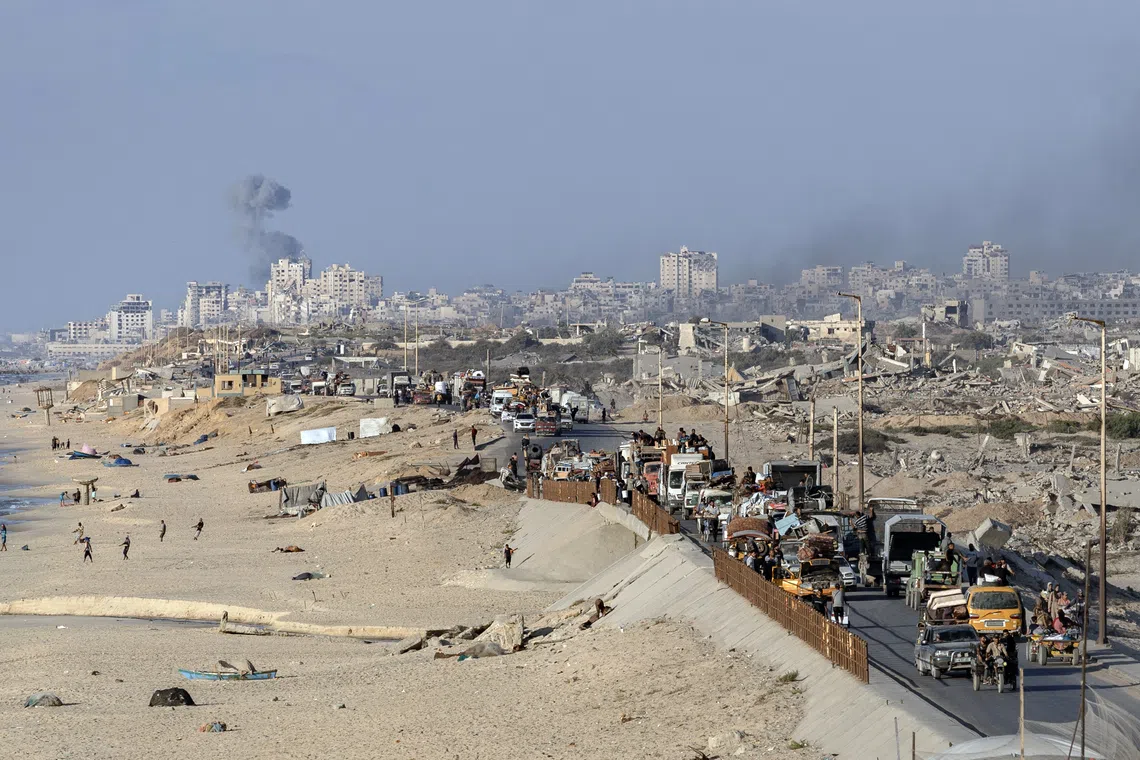UAE presses Netanyahu to back Trump Gaza plan, warns against West Bank annexation
Sign up now: Get ST's newsletters delivered to your inbox

Israel's assault on Gaza has killed more than 66,000 Palestinians, according to medical authorities in the territory.
PHOTO: SAHER ALGHORRA/NYTIMES
Follow topic:
ABU DHABI - The UAE is pressing Israeli Prime Minister Benjamin Netanyahu to accept US President Donald Trump’s Gaza peace proposal at their meeting later on Sept 29 and to abandon any plan to annex the West Bank, a delegate with knowledge of the matter told Reuters.
The United Arab Emirates, the most prominent Arab country to normalise ties with Israel
The Israeli leader faces pressure to annex the West Bank from far-right politicians who want to extend sovereignty over the area and snuff out hopes for a Palestinian state.
A senior Israeli official has said that Mr Netanyahu will give Israel's response to Mr Trump's Gaza peace proposal
The UAE position on Mr Trump's Gaza peace plan was communicated to Mr Netanyahu by its Foreign Minister Sheikh Abdullah bin Zayed in a meeting with the Israeli leader on the sidelines of the UN General Assembly in New York on Sept 26, the delegate said.
The contents of Mr Sheikh Abdullah's remarks to Mr Netanyahu at the meeting have not been previously reported.
In Jerusalem, there was no immediate response from Mr Netanyahu's office to a request for comment.
Mr Sheikh Abdullah, whose country wields diplomatic sway across the Middle East due to its wealth, strategic location and assertive foreign policy, said the UAE backs the US plan, describing it as offering significant benefits to all parties.
He called on Mr Netanyahu to engage seriously with the Trump administration to move the plan forward to implementation, the delegate said.
Mr Trump met several Arab and Muslim leaders on the sidelines of the UN General Assembly in New York last week to promote his 21-point framework to end the nearly two-year-old Israel-Hamas war and win freedom for hostages still held by the Palestinian militant group.
On Sept 28, Mr Trump told Reuters he hoped that at the Sept 29 meeting he would get Mr Netanyahu's agreement on the framework.
The White House said on Sept 29 that Israel and Hamas are "very close" to agreeing a framework deal to end the Gara war.
Mr Abdulaziz al-Sager, Chairman of Saudi-based Gulf Research Center think tank, said Saudi Arabia welcomed two key commitments he said Mr Trump had made: No forced deportation from Gaza and No annexation of the West Bank.
Arab states persuade Trump that annexation untenable
He said the kingdom’s message to Mr Trump has been consistent and unequivocal: Saudi Arabia will not normalise relations with Israel or join the Abraham Accords without a firm commitment to a two-state solution, including a viable Palestinian state.
According to the Arab delegate, Arab and Muslim states successfully persuaded Mr Trump himself at their meeting that annexation was untenable - prompting the US president to publicly disavow the idea.
The message to Mr Netanyahu was blunt: if Israel wants the benefits of being a “normal country” with regional ties, it must not sabotage them, the delegate said.
According to three regional sources, the 21-point Trump framework marks a shift in Washington’s approach to Gaza.
It not only encourages Palestinians to remain in the Strip but also, the three sources said, it lays out a conditional pathway toward Palestinian statehood - an idea the Trump administration had previously avoided.
The reported shift stands in contrast to Mr Trump’s earlier proposal to relocate Gaza’s entire population, a suggestion that provoked widespread international condemnation
In Washington, there was no immediate response from the White House and the State Department to a request for comment on the reported content of the peace framework.
The three sources said the plan tries to balance Palestinian aspirations with Israel’s security demands, including Hamas’s disarmament and Gaza’s demilitarisation - conditions likely to face resistance from Hamas and Mr Netanyahu’s right-wing government, which has long opposed Palestinian statehood.
It envisions a reformed Palestinian Authority eventually governing a redeveloped Gaza, and outlines the formation of a transitional Palestinian technocratic government.
A temporary stabilisation force would train a new Palestinian police force, and Israel would gradually withdraw from occupied areas, the three sources said. A US-led international body would oversee redevelopment, they said.
Israel's assault on Gaza has killed more than 66,000 Palestinians, according to medical authorities in the territory.
Most homes have been damaged or destroyed and the 2.3 million residents are living in a severe humanitarian crisis.
The war began after Hamas-led militants attacked Israeli territory in October 2023
Forty-eight hostages are still in Gaza, 20 of whom Mr Netanyahu says are still alive. REUTERS

